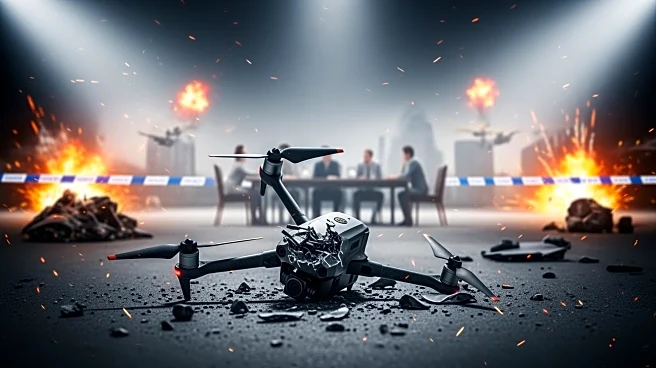What's Happening?
Russia's Defense Ministry reported that it intercepted and destroyed 193 Ukrainian drones overnight, with significant activity noted over the Moscow region. The ministry detailed that 40 drones were shot
down over Moscow, with 34 heading directly towards the capital. Additional interceptions occurred over the Bryansk, Kaluga, and Tula regions. The attacks resulted in one fatality and several injuries when a minibus was struck in the Bryansk region. Moscow Mayor Sergei Sobyanin confirmed that 36 drones were destroyed as they approached the city, and emergency services were deployed to manage debris without any reported damage or injuries in Moscow itself. The drone activity led to temporary flight suspensions at Zhukovsky and Domodedovo airports, affecting several flights. Fires were reported at an oil depot in Serpukhov and a wooded area in Kommunarka, though the causes were not specified.
Why It's Important?
The escalation in drone activity highlights the ongoing intensity of the conflict between Russia and Ukraine, with significant implications for regional security and civilian safety. The use of drones in warfare represents a shift in military tactics, potentially increasing the risk of civilian casualties and infrastructure damage. The temporary disruption of air travel in Moscow underscores the broader economic and logistical impacts of the conflict, affecting both domestic and international operations. The situation also raises concerns about the potential for further escalation, as both nations continue to engage in aggressive military strategies.
What's Next?
The continued use of drones by Ukraine suggests a strategic focus on disrupting Russian infrastructure and logistics. Russia's response, including the deployment of air defense systems, indicates a commitment to countering these tactics. The international community may increase diplomatic efforts to de-escalate tensions, while monitoring the humanitarian impact of the conflict. Further military engagements could prompt additional sanctions or international interventions aimed at stabilizing the region.
Beyond the Headlines
The conflict's reliance on drone warfare raises ethical and legal questions about the use of autonomous weapons in combat. The potential for increased civilian casualties and infrastructure damage necessitates a reevaluation of international laws governing warfare. Additionally, the conflict's impact on global energy markets and supply chains could have long-term economic consequences, influencing international relations and trade policies.











